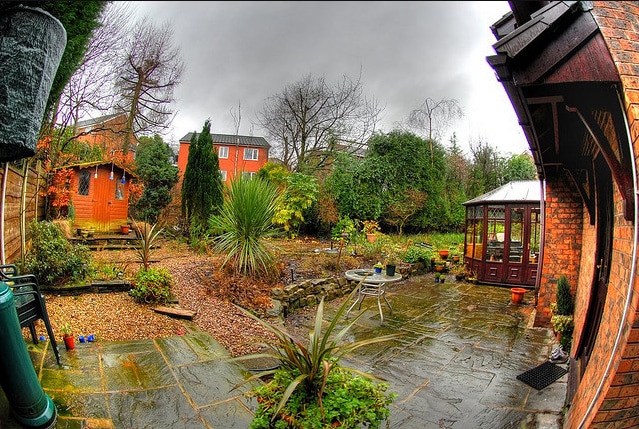Unless you landscaped your yard to replicate a Japanese Zen garden, most yards are green enough, by color. But, with pesticides, fertilizers, impervious surfaces and non-native plant species, your home’s yard is complicit in urban environmental problems rather than a soothing oasis that benefits local plant and animal life, recharges the groundwater without pollutants and can reduce the impacts of climate change and the urban heat island within your community. We think all nature lovers should enjoy the challenging of greening up their yards for the betterment of the planet, rather than impressing the Jonses next door.

Reduce maintenance, increase your land value and improve the environment by Earth-friendly yard enhancements. Photo by Matty P.
Whether your budget of time and funds is big or small, a few quick and easy landscape modifications can add beauty to your most accessible outdoor space, reduce chemical hazards for kids and pets, reduce ongoing maintenance and, in some cases, even lower your utility bills.
Here are some of our favorites:
- Fertilize your grass with homemade compost using leaves, old flowers, vegetable scraps, coffee grounds and many others. Also, regularly aerating your lawn will encourage healthier turf.
- Cut down your mow-able area of your yard with plantings that grow taller and need little maintenance. Aside from creating habitat, they will save you time and effort, while also reducing pollution and gas consumption from your mower.
- Turn a low spot in your yard into a rain garden that filters water to the underlying aquifer and provides an attractive home for grasses and flowers that thrive in occasionally wet conditions.
- Mulch any gardens or landscaping beds, avoiding direct contact with stems or tree trunks. It will lead to healthier plants that need less watering and fertilization, while also reducing the impact of weeds.
- Choose plants that resist pests. Talk to experts at your local nursery for tips on selecting plants that are pest- and disease-resistant to save money on pest control or eventual removal.
- Plant native species! They will be more inviting for birds, butterflies and other wildlife, without introducing any new problems into your ecosystem like many invasive species can.
- Birdbaths and other water sources, as long as they’re cleaned regularly, can help many critters in your neighborhood — not just birds.
- Become a birdwatcher quickly and cheaply by putting out birdseed and nectar for hummingbirds. You will be surprised how many feathered friends will drop by.
Sources: EPA.gov, www.raingardennetwork.com


